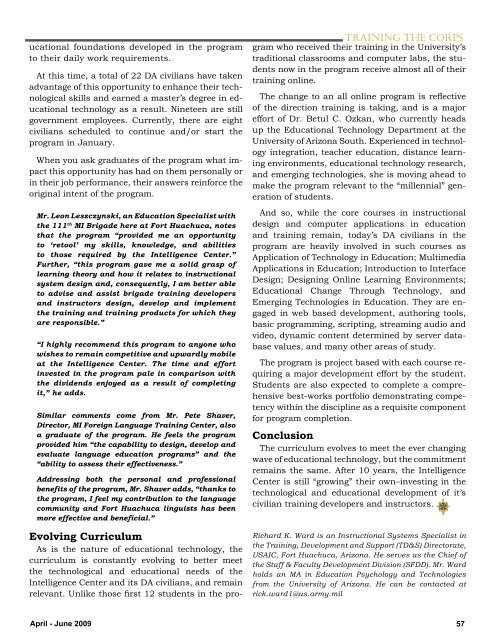Military Intelligence Professional Bulletin - Federation of American ...
Military Intelligence Professional Bulletin - Federation of American ...
Military Intelligence Professional Bulletin - Federation of American ...
Create successful ePaper yourself
Turn your PDF publications into a flip-book with our unique Google optimized e-Paper software.
ucational foundations developed in the program<br />
to their daily work requirements.<br />
At this time, a total <strong>of</strong> 22 DA civilians have taken<br />
advantage <strong>of</strong> this opportunity to enhance their technological<br />
skills and earned a master’s degree in educational<br />
technology as a result. Nineteen are still<br />
government employees. Currently, there are eight<br />
civilians scheduled to continue and/or start the<br />
program in January.<br />
When you ask graduates <strong>of</strong> the program what impact<br />
this opportunity has had on them personally or<br />
in their job performance, their answers reinforce the<br />
original intent <strong>of</strong> the program.<br />
Mr. Leon Leszczynski, an Education Specialist with<br />
the 111 th MI Brigade here at Fort Huachuca, notes<br />
that the program “provided me an opportunity<br />
to ‘retool’ my skills, knowledge, and abilities<br />
to those required by the <strong>Intelligence</strong> Center.”<br />
Further, “this program gave me a solid grasp <strong>of</strong><br />
learning theory and how it relates to instructional<br />
system design and, consequently, I am better able<br />
to advise and assist brigade training developers<br />
and instructors design, develop and implement<br />
the training and training products for which they<br />
are responsible.”<br />
“I highly recommend this program to anyone who<br />
wishes to remain competitive and upwardly mobile<br />
at the <strong>Intelligence</strong> Center. The time and effort<br />
invested in the program pale in comparison with<br />
the dividends enjoyed as a result <strong>of</strong> completing<br />
it,” he adds.<br />
Similar comments come from Mr. Pete Shaver,<br />
Director, MI Foreign Language Training Center, also<br />
a graduate <strong>of</strong> the program. He feels the program<br />
provided him “the capability to design, develop and<br />
evaluate language education programs” and the<br />
“ability to assess their effectiveness.”<br />
Addressing both the personal and pr<strong>of</strong>essional<br />
benefits <strong>of</strong> the program, Mr. Shaver adds, “thanks to<br />
the program, I feel my contribution to the language<br />
community and Fort Huachuca linguists has been<br />
more effective and beneficial.”<br />
Evolving Curriculum<br />
As is the nature <strong>of</strong> educational technology, the<br />
curriculum is constantly evolving to better meet<br />
the technological and educational needs <strong>of</strong> the<br />
<strong>Intelligence</strong> Center and its DA civilians, and remain<br />
relevant. Unlike those first 12 students in the pro-<br />
trAInInG tHE COrPs<br />
gram who received their training in the University’s<br />
traditional classrooms and computer labs, the students<br />
now in the program receive almost all <strong>of</strong> their<br />
training online.<br />
The change to an all online program is reflective<br />
<strong>of</strong> the direction training is taking, and is a major<br />
effort <strong>of</strong> Dr. Betul C. Ozkan, who currently heads<br />
up the Educational Technology Department at the<br />
University <strong>of</strong> Arizona South. Experienced in technology<br />
integration, teacher education, distance learning<br />
environments, educational technology research,<br />
and emerging technologies, she is moving ahead to<br />
make the program relevant to the “millennial” generation<br />
<strong>of</strong> students.<br />
And so, while the core courses in instructional<br />
design and computer applications in education<br />
and training remain, today’s DA civilians in the<br />
program are heavily involved in such courses as<br />
Application <strong>of</strong> Technology in Education; Multimedia<br />
Applications in Education; Introduction to Interface<br />
Design; Designing Online Learning Environments;<br />
Educational Change Through Technology, and<br />
Emerging Technologies in Education. They are engaged<br />
in web based development, authoring tools,<br />
basic programming, scripting, streaming audio and<br />
video, dynamic content determined by server database<br />
values, and many other areas <strong>of</strong> study.<br />
The program is project based with each course requiring<br />
a major development effort by the student.<br />
Students are also expected to complete a comprehensive<br />
best-works portfolio demonstrating competency<br />
within the discipline as a requisite component<br />
for program completion.<br />
Conclusion<br />
The curriculum evolves to meet the ever changing<br />
wave <strong>of</strong> educational technology, but the commitment<br />
remains the same. After 10 years, the <strong>Intelligence</strong><br />
Center is still “growing” their own–investing in the<br />
technological and educational development <strong>of</strong> it’s<br />
civilian training developers and instructors.<br />
Richard K. Ward is an Instructional Systems Specialist in<br />
the Training, Development and Support (TD&S) Directorate,<br />
USAIC, Fort Huachuca, Arizona. He serves as the Chief <strong>of</strong><br />
the Staff & Faculty Development Division (SFDD). Mr. Ward<br />
holds an MA in Education Psychology and Technologies<br />
from the University <strong>of</strong> Arizona. He can be contacted at<br />
rick.ward1@us.army.mil<br />
April - June 2009 57
















